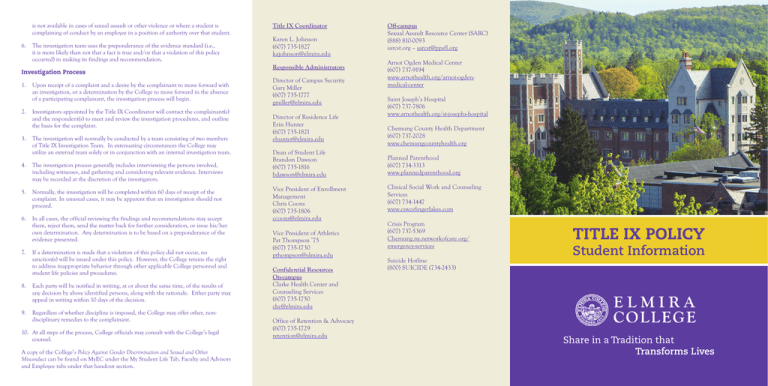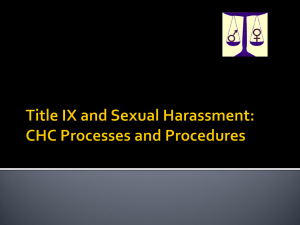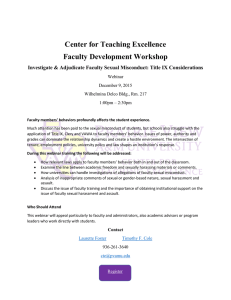
is not available in cases of sexual assault or other violence or where a student is
complaining of conduct by an employee in a position of authority over that student.
6. The investigation team uses the preponderance of the evidence standard (i.e.,
it is more likely than not that a fact is true and/or that a violation of this policy
occurred) in making its findings and recommendation.
Investigation Process
1. Upon receipt of a complaint and a desire by the complainant to move forward with
an investigation, or a determination by the College to move forward in the absence
of a participating complainant, the investigation process will begin.
2. Investigators appointed by the Title IX Coordinator will contact the complainant(s)
and the respondent(s) to meet and review the investigation procedures, and outline
the basis for the complaint.
3. The investigation will normally be conducted by a team consisting of two members
of Title IX Investigation Team. In extenuating circumstances the College may
utilize an external team solely or in conjunction with an internal investigation team.
4. The investigation process generally includes interviewing the persons involved,
including witnesses, and gathering and considering relevant evidence. Interviews
may be recorded at the discretion of the investigators.
5. Normally, the investigation will be completed within 60 days of receipt of the
complaint. In unusual cases, it may be apparent that an investigation should not
proceed.
6. In all cases, the official reviewing the findings and recommendations may accept
them, reject them, send the matter back for further consideration, or issue his/her
own determination. Any determination is to be based on a preponderance of the
evidence presented.
7. If a determination is made that a violation of this policy did not occur, no
sanction(s) will be issued under this policy. However, the College retains the right
to address inappropriate behavior through other applicable College personnel and
student life policies and procedures.
8. Each party will be notified in writing, at or about the same time, of the results of
any decision by above identified persons, along with the rationale. Either party may
appeal in writing within 10 days of the decision.
9. Regardless of whether discipline is imposed, the College may offer other, nondisciplinary remedies to the complainant.
10. At all steps of the process, College officials may consult with the College’s legal
counsel.
A copy of the College’s Policy Against Gender Discrimination and Sexual and Other
Misconduct can be found on MyEC under the My Student Life Tab, Faculty and Advisors
and Employee tabs under that handout section.
Title IX Coordinator
Karen L. Johnson
(607) 735-1827
kajohnson@elmira.edu
Responsible Administrators
Director of Campus Security
Gary Miller
(607) 735-1777
gmiller@elmira.edu
Director of Residence Life
Erin Hunter
(607) 735-1821
ehunter@elmira.edu
Dean of Student Life
Brandon Dawson
(607) 735-1816
bdawson@elmira.edu
Vice President of Enrollment
Management
Chris Coons
(607) 735-1806
ccoons@elmira.edu
Vice President of Athletics
Pat Thompson ’75
(607) 735-1730
pthompson@elmira.edu
Confidential Resources
On-campus
Clarke Health Center and
Counseling Services
(607) 735-1750
chc@elmira.edu
Office of Retention & Advocacy
(607) 735-1729
retention@elmira.edu
Off-campus
Sexual Assault Resource Center (SARC)
(888) 810-0093
sarcst.org – sarcst@ppsfl.org
Arnot Ogden Medical Center
(607) 737-9194
www.arnothealth.org/arnot-ogdenmedical-center
Saint Joseph’s Hospital
(607) 737-7806
www.arnothealth.org/st-josephs-hospital
Chemung County Health Department
(607) 737-2028
www.chemungcountyhealth.org
Planned Parenthood
(607) 734-3313
www.plannedparenthood.org
Clinical Social Work and Counseling
Services
(607) 734-1447
www.cswcsfingerlakes.com
Crisis Program
(607) 737-5369
Chemung.ny.networkofcare.org/
emergency-services
Suicide Hotline
(800) SUICIDE (734-2433)
TITLE IX POLICY
Student Information
INTRODUCTION
As a recipient of federal funds, Elmira College is required to comply with Title
IX of the Higher Education Amendments of 1972, 20 U.S.C. & 1681 et seq.,
which prohibits discrimination on the basis of sex in educational programs or
activities. Pursuant to the Violence Against Women Act (“VAWA”), the College
also prohibits domestic/dating violence and stalking where it impacts or has
the potential to impact the educational or employment environment of a
College community member. The College will advise complainants of their
rights under Title IX and will take steps necessary to prevent harassment and
to correct its discriminatory effects, as appropriate.
Misconduct, as defined in this policy, can violate Title IX and/or the VAWA.
In compliance with Title IX and VAWA, the College provides a procedure for
reporting, investigating, and adjudicating Misconduct.
This policy applies to all students, faculty, and staff of Elmira College. This
policy applies to conduct on-campus and in connection with any Collegesponsored program or activity, regardless of where it occurs. Additionally,
off-campus conduct may violate this policy if the conduct creates a threatening
or uncomfortable work or learning environment on Elmira’s campus or within
any College program, or if the incident causes concern for the safety or security
of the College’s campus. Non-community members (e.g., alumni, family of
students, vendors, etc.) visiting campus or participating in any College program
or activity are expected to abide by the behavioral expectations in this policy.
Terminology
Complainant: The term complainant refers to the person making the complaint or
report. That person is usually the person who has been the victim of an alleged act of
Misconduct or other violation of this policy.
Consent to any sexual act or prior consensual sexual activity between or with any party
does not necessarily constitute consent to any other sexual act. Consent may be initially
given but withdrawn at any time by expressing in words or actions that they no longer
want the sexual act to continue. When consent is withdrawn or can no longer be given,
sexual activity must stop.
Consent cannot be given when a person is incapacitated, which occurs when an individual
lacks the ability to knowingly choose to participate in sexual activity. Incapacitation may
be caused by the lack of consciousness or being asleep, being involuntarily restrained,
or if an individual otherwise cannot consent. In New York, a person under the age of
17 is incapable of giving consent to any sexual activity. Depending on the degree of
intoxication, someone who is under the influence of alcohol, drugs, or other intoxicants
may be incapacitated and therefore unable to consent. Consent is required regardless
of whether the person initiating the act is under the influence of drugs and/or alcohol.
Consent cannot be given when it is the result of any coercion, intimidation, force, or
threat of harm.
Dating Violence: physical violence (hitting, punching, kicking, etc.) or threats of violence
or acts of physical intimidation or coercion committed by a person who is or has been in a
social relationship of a romantic or intimate nature with the victim.
Domestic Violence: physical violence, threats of violence or acts of physical intimidation
or coercion between spouses or former spouses, cohabitating romantic partners or
individuals who were formerly cohabitating romantic partners, individuals who share a
child in common, or others in a family relationship
Stalking: engaging in a course of conduct directed at a specific person that would cause a
reasonable person to fear for his or her safety or the safety of others; or suffer substantial
emotional distress. Stalking behavior includes but is not limited to repeated, intentional
following, surveilling or observing another; or using “spyware” or other electronic means
to gain impermissible access to a person’s private information.
Sexually-related misconduct: a form of Misconduct as defined by this policy, is a category
of behavior that includes actual or attempted:
Respondent: The term respondent refers to the person alleged to have committed the
alleged Misconduct or other violation of this policy.
1. Sexual harassment
Witness: an individual who is present during an incident that violates the Title IX policy.
2. Non-Consensual sexual contact (including non-consensual sexual intercourse or
sexual exploitation).
Consent: Elmira expects that any sexual activity or contact will be based on mutual
affirmative consent to the specific sexual activity or sexual contact. All references to
consent in this policy will mean affirmative consent which is defined as follows:
Affirmative consent is a knowing, voluntary, and mutual decision among all participants
to engage in sexual activity. Consent can be given by words or actions, as long as those
words or actions create clear permission regarding willingness to engage in the sexual
activity. Silence or lack of resistance, in and of itself, does not demonstrate consent. The
definition of consent does not vary based upon a participant’s sex, sexual orientation,
gender identity, or gender expression.
Sexually-related misconduct can occur between strangers or non-strangers, including
people involved in an intimate or sexual relationship. Sexually related misconduct can be
committed by males or by females, and it can occur between people of the same or different sex. Sexual violence is also a form of sexually-related misconduct.
Retaliation
It is a violation of College policy to retaliate against any person making a report of
Misconduct or against any person cooperating in the investigation of (including testifying
as a witness to) any allegation of Misconduct. The College will not only take steps to
prevent retaliation but will take strong responsive action if retaliation occurs and anyone
engaging in retaliation is subject to disciplinary action, up to and including expulsion/
termination. Retaliation includes intimidation, threats, or harassment against any
such reporting party or third party. Retaliation should be reported promptly to Title
IX Coordinator and may result in disciplinary action independent of the sanction
or interim measures imposed in response to the underlying allegations of sexual
misconduct.
Report to a Responsible Administrator
Any Elmira student who wishes to report a formal complaint of Misconduct against
a member of the Elmira community may do so by contacting Campus Security, the
Director of Residence Life, the Dean of Student Life, the Vice President of Enrollment
Management, the Vice President of Athletics, or the Title IX Coordinator.
These individuals have been trained to receive and respond to allegations of violations
of the policy. Complaints can be made by those who have been the victim of a violation
of this policy, by a third party on a victim’s behalf or anonymously. The names of the
Responsible Administrators are included in this brochure.
Confidential Resources
Students or other community members who are not sure whether they want to
make a formal complaint can still seek help from the confidential resources listed
in this brochure. These resources are provided to offer non-judgmental support and
information to help an individual decide what is best for him or her as he or she
recovers.
Procedures for Investigating Alleged Violations of this Misconduct
Policy
1. The College’s investigation of a complaint and final action will normally be
completed within 60 days, unless the Title IX Coordinator grants an extension for
good cause. Both parties will be kept informed of any scheduling delays.
2. Elmira College may take interim measures to ensure that there is not any
interaction between all parties involved with the investigation. Examples may
include: making alternate housing arrangements, adjusting class schedules, and
issuing ‘no contact’ orders to all parties.
3. No direct cross-examination is permitted during the investigation, hearing, or
appeal process. The respondent is not permitted to confront the complainant in
any Title IX investigation.
4. The complainant and respondent will be permitted to have an advisor attend any
investigatory interview/ meeting with him/her. Unless the matter involves a sexual
assault, domestic or dating violence, or stalking, the advisor must be a non-attorney
member of the campus community.
5. In some cases, a mediated resolution may be appropriate. This may be the case
in instances of more minor acts of insensitivity or misunderstandings. Mediation


